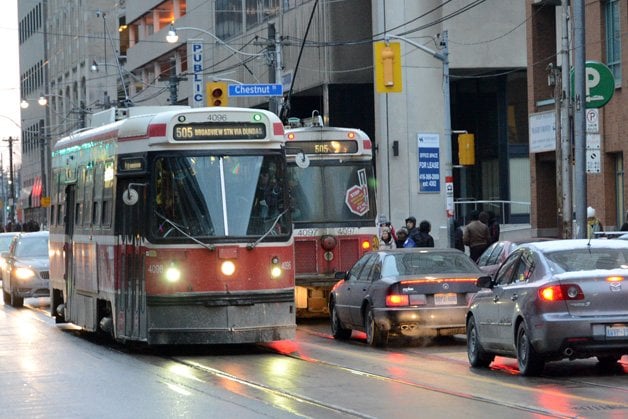
The TTC board has given the green light to a landmark report on improving the surface transit network, but it will be up to the next term of council to determine whether the plan is implemented.
The surprise report was released by commission staff late Friday and outlines nine proposals to improve bus and streetcar service over the next five years.
It was given unanimous backing “in principle” by the 11-member board at its last meeting before the October 27 election, but as spelled out in a motion moved by TTC chair Councillor Maria Augimeri, the commission’s CEO will include the plan in his 2015 budget submission, meaning the new council will have the final vote on approval this winter.
After the vote Augimeri said she was optimistic the recommendations would be endorsed by the incoming crop of councillors. “Do they all come together and save public transit in Toronto? I hope that they do,” she said.
The major question mark is how to pay for the proposed measures, which include switching to a two-hour time-based transfer system, allowing all-door boarding on streetcar routes, reducing crowding standards and wait times, and adding more streetcar and bus service. According to the report, taken together the proposals would cost $288 million in infrastructure investment and up to $69 million in annual operating funding by the fifth year of the plan.
The leading mayoral candidates have endorsed parts of the plan, but most have stopped short of embracing it fully.
Tuesday morning Mayor Rob Ford promised to invest $30 million surface transit if re-elected, even though in 2011 he cut the TTC’s budget, resulting in more crowding and reduced or eliminated service on many bus routes.
The mayor supports the report’s proposal to expand express bus routes, create a city-wide network of 10-minute-or-less bus service, and reduce wait times and crowding, but contrary to what TTC CEO Andy Byford said Tuesday, the mayor claims these improvements can be made without hiring more transit workers.
Ford said he would pay for the plan by reintroducing $100 million worth of budget “efficiencies,” most of which were rejected by council in the January budget debate.
Three other mayoral candidates-Olivia Chow, John Tory and David Soknacki-crashed the TTC meeting to give reporters their opinions on the plan.
Chow claimed that the report reflected her own transit platform and said she was pleased that the board and TTC staff “have agreed that we must get people moving now.”
One section of Augimeri’s motion in particular appeared gift-wrapped for Chow: it asked staff to look into extending the life of buses so that service could be improved in 2015 and 2016 without the purchase of new vehicles. Chow made a similar proposal months ago as part of a plan to improve rush hour bus service by 10 per cent.
Chow said she could not support the more costly elements of the plan however, like the two-hour time-based transfer, which would cost $20 million in lost revenue.
Tory, who blasted the report on Monday as “very costly” and accused the TTC of trying to ram through a major proposal before an election, backtracked on Tuesday. Although Augimeri said before the meeting that it was never the commission’s intention to win council approval before the election, Tory welcomed her motion that explicitly referring it to the 2015 budget process. “That’s exactly where it belongs,” he said.
Soknacki came closest to a wholesale endorsement, calling the report “a hope and encouragement document” that gives transit riders reason to believe “there’s going to be an improvement, not in a decade but next year.”
TTC Commissioner Karen Stintz, who presided over the 2011 service cuts and stepped down as TTC chair in February to run for mayor, stayed silent during the debate but voted in favour of the report.
Despite the unanimous vote, some members questioned how such a major proposal ended up on the agenda without an explicit request from the board. In a blunt speech to the committee room Councillor Josh Colle suggested TTC staff had acted on their own and because final funding approval was up to council, the board was little more than a bystander.
“It’s time we take a hard look at why this body even exists,” said Colle, who earlier this year vied unsuccessfully to replace Stintz as TTC chair. “If we’re just rubber stamping staff reports, there’s no value to that.”
Byford said the report grew out of the board’s January request to study time-based fares, as well as recent discussions at City Hall about all-door boarding. While the final product was much wider in scope the transit chief insisted it was well within his mandate.
“The very reason why we’re here as a management team is to improve transit in Toronto, that’s our job,” said Byford. “If we don’t take steps to improve the customers’ experience now I think the TTC will just slowly decline.”
bens@nowtoronto.com | @BenSpurr












